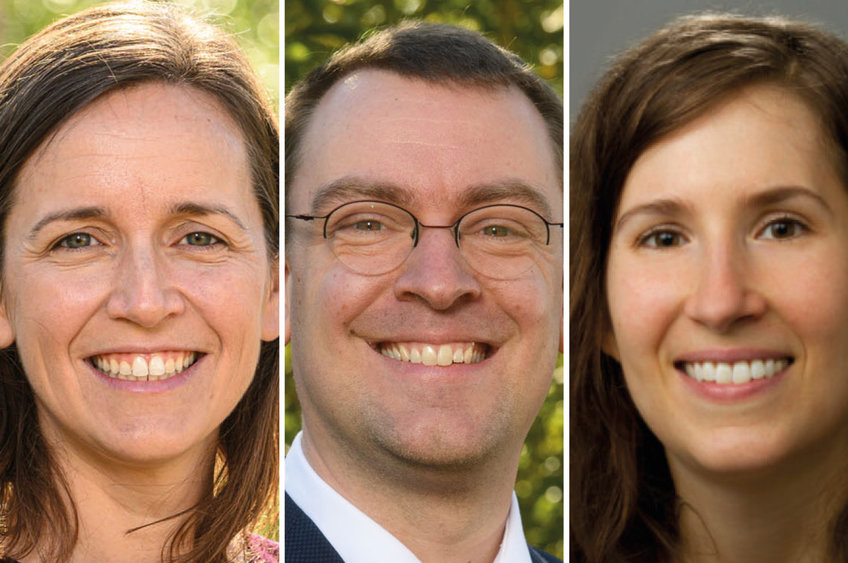Max Planck-Humboldt Research Award for studies on censorship and disinformation
Award for political scientist Margaret Roberts and Medals for Vanessa Ogle and Wim Decock
The Max Planck-Humboldt Research Award 2022 goes to political scientist Margaret Roberts from the University of California San Diego. In her research, she has uncovered how the Chinese state uses information technologies for censorship. Vanessa Ogle will receive a Max Planck-Humboldt Medal for her historical research on capitalism and globalization, and Wim Decock will be awarded with a Max Planck-Humboldt Medal for his contributions to the historical connections between religion, law and capitalism.

Every second, millions of Internet users around the world send short messages, discuss in online forums or share their views on social media accounts with hundreds of thousands of followers. How can it still be that individual authoritarian regimes and criminals effectively spread fake news on the Internet and manipulate the public? That is the central question of Margaret (Molly) Roberts' research. The political scientist from the University of California San Diego, has developed innovative analytical tools for this question in recent years and has gained important insights.
Methodologically, Roberts has done pioneering work in the field of topic modeling: This method can be used to examine collections of texts, such as parliamentary speeches or media articles, for higher-level topic areas and hidden semantic structures. In terms of content, Margaret Roberts has gained far-reaching insights into censorship and online propaganda in China: According to these findings, the Chinese state uses the Internet to silence dissidents when collective protests are expected. The regime uses censorship strategically to target the public with selected content. For example, one strategy is to flood the Internet with irrelevant content to divide the people whenever discontent or criticism arises.
From San Diego to Munich and Konstanz
Margaret Roberts studied international relations and economics at Stanford University, where she also completed a master's degree in statistics. In 2014, she received her PhD in Government from Harvard University under Gary King, a world-leading specialist in quantitative methods. Margaret Roberts is currently Professor in the Department of Political Science and the Halıcıoğlu Data Science Institute at the University of California San Diego. She is also co-director of the China Data Lab there at the 21st Century China Center.
Her exceptional career and innovative research profile convinced the Nomination Committee and the Board of the Max Planck-Humboldt Research Award. Margaret Roberts has submitted a promising proposal for the collaborative project in Germany associated with the award: In collaboration with the Technical University of Munich and the University of Konstanz, she plans to analyze the opaque moderation procedures of social media platforms. Given the threatening effects of these techniques on our democracies, the topic is extremely relevant. The prize money of 1.5 million euros will help her to significantly advance research in this area.
A new understanding of time
In addition to the research award, one Max Planck-Humboldt Medal goes to a historian: Vanessa Ogle, Associate Professor of History at Yale University, has created a completely new understanding of how the concept of time has changed over 80 years against the backdrop of economic and social changes with her book "The Global Transformation of Time: 1870–1950". Currently, the German-born author is working on a book that traces the emergence of tax havens, offshore finance, flags of convenience, and free trade zones, shedding light on this sophisticated system that often escapes the grasp of national governments and regulators.
At the interface between theology, legal and economic history
The second Max Planck-Humboldt Medal 2022 will be awarded to Wim Decock. The professor of Roman law, legal history and comparative law at the Universities of Louvain-la-Neuve and Liége, Belgium, is considered one of the leading historians of his generation in the field of law and late scholasticism. In his book "Theologians and Contract Law", Decock explores the intersections between legal and economic history and theology. The book is one of the most important recent contributions to the legal history of modern European contract law.
About the Award
The Max Planck Society and the Alexander von Humboldt Foundation annually confer the Max Planck-Humboldt Research Award, endowed with 1.5 million euros, to a researcher from abroad. The award is supplemented by 80,000 euros in personal prize money. The focus is on personalities whose work is characterized by outstanding future potential. The prize is intended to attract particularly innovative scientists working abroad to spend flexible periods of time at a German university or research institution. The Federal Ministry of Education and Research provides the funding.
The award is annually alternating between the natural and engineering sciences, the life sciences, and the humanities and social sciences. In addition, up to two further individuals may each be awarded a Max Planck-Humboldt Medal. This is endowed with a personal prize money of 60,000 euros.
The award ceremony for the Max Planck-Humboldt Research Awards and the Max Planck-Humboldt Medals for the years 2022 and 2021 (see also https://www.mpg.de/17608978/max-planck-humboldt-research-award-2021) will take place in Berlin on November 3, 2022.












